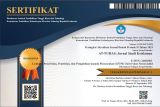Assessing The Relation Between Majority and Minority Groups: A Critical Study on the Spirit of Domination in a Heterogeneous Society
(1) * Miftahul Huda
 (UIN Maulana Malik Ibrahim Malang)
(UIN Maulana Malik Ibrahim Malang) Indonesia
(*) Corresponding Author
AbstractGroup relation within any heterogeneous society in which people with their different characteristics and identities live together tends to run unequally due to the majorities’ domination toward minorities. Their spirit of domination is philosophically based on Charles Darwin’s theory of evolution “The Survival of the Fittest” which later incarnates itself in social domain and is used to justify that their domination upon minority groups is a kind of natural selection process. When this idea is perceived continuously from generation to generation, minorities will be the everlasting disadvantaged victims of the other group’s domination and suffer persistent annihilation and oppression, extending from the most moderate form like prejudice to the most extreme one such as discrimination. Besides being intended to discuss the complicated relation between majority and minority groups and explore the significance of the spirit of domination in determining the dynamics of group relation, this study is also aimed at offering some alternative ways to create egalitarian atmosphere in a heterogeneous society. Indeed, such new future is not impossible to be reached as far as reconciliation process is consistently carried out by both groups. Reconciliation, which might involve assimilation, accommodation, amalgamation, and pluralism, is the main key to realize equal and mutual relation between majority and minority groups
|
Full Text: PDF
Refbacks
- There are currently no refbacks.
Copyright (c) 2018 Miftahul Huda
This journal is licensed under a
Creative Commons Attribution-ShareAlike 4.0 International License





.png)






